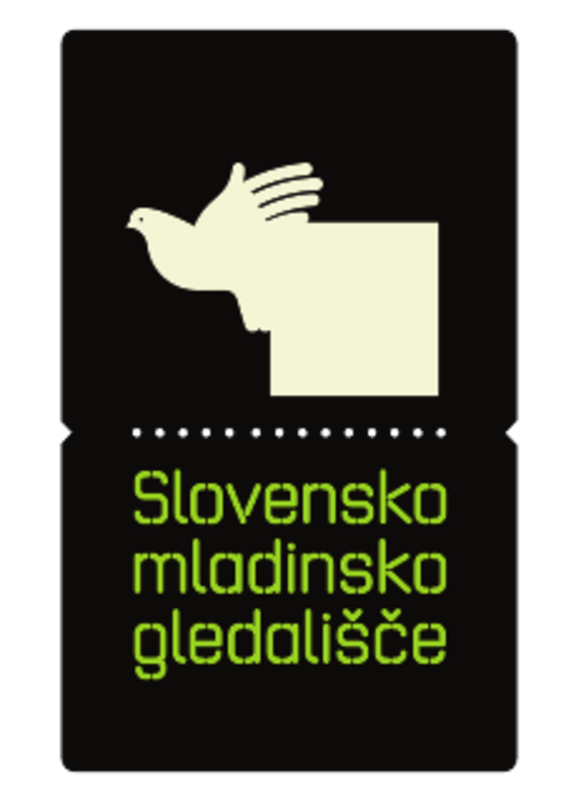Mladinsko Theatre
-
1 Oct 2024
"Solo", an improvisation project by Nina Rajić Kranjac, Nataša Keser, Benjamin Krnetić, and Marko Mandić. Co-production by Maska Institute and Mladinsko Theatre.
at the World Theatre Festival Zagreb
-
to
27 Sep 2024
28 Sep 2024
A series of lecture-peformances about sexual pleasure of women titled "Sex Education II - Struggle". The fifth and last part reconstructs the struggle for reproductive rights in Yugoslavia. Written by Tjaša Črnigoj, Sendi Bakotić, Vanda Velagić, Tijana Todorović and Lene Lekše. Co-produced by Mladinsko Theatre, Maska Institute and City of Women.
at the Bitef Festival
-
25 May 2024
"Sex Education II: Fight - Spolna vzgoja II: Borba" is a lecture-performance about the fight for reproductive rights in Yugoslavia. Directed by Tjaša Črnigoj and coproduced by Mladinsko Theatre, Maska Institute, and City of Women.
at the ZOOM festival
-
24 Apr 2024
A performance of "Saint Joan of the Stockyards - Sveta Ivana Klavniška", a Slovene production of Bertold Brecht's play by Mladinsko Theatre in collaboration with Cankarjev dom. Featuring music by Laibach and cast members from Slovenia, Italy, and Luxembourg. Coproduced by Emilia Romagna Teatro Bologna/Teatro Nazionale, TNL – Théâtre National du Luxembourg, ErosAntEros – POLIS Teatro Festival, and Teatro Stabile di Bolzano.
-
to
18 Apr 2024
21 Apr 2024
Four performances of "Saint Joan of the Stockyards - Sveta Ivana Klavniška", a Slovene production of Bertold Brecht's play by Mladinsko Theatre in collaboration with Cankarjev dom. Featuring music by Laibach and cast members from Slovenia, Italy, and Luxembourg. Coproduced by Emilia Romagna Teatro Bologna/Teatro Nazionale, TNL – Théâtre National du Luxembourg, ErosAntEros – POLIS Teatro Festival, and Teatro Stabile di Bolzano. The play premieres on the 18th of April.
-
to
14 Apr 2024
16 Apr 2024
A performance of "Sex Education II: FIGHT - Spolna vzgoja II: Borba", a final part of a cycle of performative lectures on women's sexual pleasure, reconstructing the struggle for reproductive freedom in Yugoslavia. Directed by Tjaša Črnigoj and coproduced by Mladinsko Theatre, Maska Institute, and City of Women.
-
21 Dec 2023
-
25 Nov 2023
-
16 Nov 2023
"Maša za Jugoslavijo - Mass for Yugoslavia", an international co-production featuring Mladinsko Theatre, HNK Ivana pl. Zajca Rijeka, Bitef Teatar, MOT Skopje.
at the 6. Berliner Herbstsalon 2023
-
30 Jun 2023
Performance Crises directed by Žiga Divjak and produced by Mladinsko Theatre and The New Post Office in co-production with Maska Institute, Bitef (Belgrade/Serbia) and the Domino Association (Zagreb/Croatia). A part of the ACT project - Art, Climate, Transition, a European cooperation project.
at the Festival Perforacije Zagreb
-
26 May 2023
Croatia Rijeka
Crises directed by Žiga Divjak produced by Mladinsko Theatre, a part of the European project ACT: Art, Climate, Transition
at the Festival Zoom
-
11 May 2023
Austria Bleiburg/Pliberk
-
7 May 2023
Italy Ravenna Teatro Rossi
Gejm directed by Žiga Divjak, produced by Mladinsko Theatre, Maska Institute
at the Festival POLIS Teatro
-
26 Mar 2023
-
to
11 Mar 2023
12 Mar 2023
Germany Berlin Deutsches Theater
Crises directed by Žiga Divjak produced by Mladinsko Theatre, a part of the European project ACT: Art, Climate, Transition
at the Radar Ost Festival
-
to
11 Mar 2023
12 Mar 2023
Performance Crises directed by Žiga Divjak and produced by Mladinsko Theatre and The New Post Office in co-production with Maska Institute, Bitef (Belgrade/Serbia) and the Domino Association (Zagreb/Croatia). A part of the ACT project - Art, Climate, Transition, a European cooperation project. Related: Embassy of the Republic of Slovenia Berlin, SKICA Berlin, Slovenian Cultural Centre
at the RADAR OST
-
26 Sep 2021
The Way Out edition of the festival presents also the Žiga Divjak's performance Heat, coproduced by Mladinsko Theatre and the festival
at the Steirischer Herbst
-
6 Jun 2021
Art is a Cupboard after Daniil Harms, directed by Ivan Peternelj, produced by Mladinsko Theatre
at the Fadil Hadžić Satire Days
-
to
11 Mar 2021
21 Mar 2021
Baal, a drama piece written by Andrej Rozman Roza (based on motives by B. Brecht), directed by Vito Taufer, produced by Mladinsko Theatre
at the Teatar na raskršću Festival
-
to
12 Mar 2020
22 Mar 2020
The German premiere of Stop Me, directed by Eva Nina Lampič and co-produced by Mladinsko Theatre and Staatstheater Nürnberg,
-
to
28 Nov 2019
29 Nov 2019
The performances Hero 3.0 - More Than Words by Uroš Kaurin and Vito Weis, produced by Moment Arts and Culture Association; The Opposite of Things, directed by Boris Nikitin and produced by Mladinsko Theatre,
at the Desiré Central Station
-
to
11 Oct 2019
23 Oct 2019
Theatre performances The Damned, produced by the Slovene National Theatre Maribor; and Ball, directed by Vito Taufer and produced by Mladinsko Theatre, and the musical The Adams Family, directed by Aleksandar Popovski and produced by Ljubljana City Theatre (MGL),
at the Gavella Evenings
-
to
13 Sep 2019
14 Sep 2019
The performance The Little Wire Girl, directed by Marjan Nečak and produced by the Slovene National Theatre Drama Ljubljana, and no title yet by Simona Semenič, directed by Tomi Janežič and produced by Mladinsko Theatre,
at the MOT International Theatre Festival
-
9 Aug 2019
The theatre performance 6, directed by Žiga Divjak and produced by Maska Institute and Mladinsko Theatre,
at the International Meeting of Free Theatres Thealter
-
to
6 Jul 2019
7 Jul 2019
Our Violence and Your Violence, directed by Oliver Frljić and co-produced by the Mladinsko Theatre,
at the Barski ljetopis Festival
-
21 May 2019
no title yet by Simona Semenič, directed by Tomi Janežič and produced by Mladinsko Theatre,
at the Euroregional Theatre Festival TESZT
-
to
15 Mar 2019
17 Mar 2020
The performance Conversations About Love, an original project by Jernej Lorenci and the team, co-produced by the Slovene National Theatre Drama Ljubljana, and Baal, directed by Vito Taufer and produced by Mladinsko Theatre,
at the Theatre at a Crossroads
-
to
25 Nov 2018
1 Dec 2018
The performances The Idiots, directed by Nina Rajić Kranjac and produced by Mladinsko Theatre; Hero 2.0 by Uroš Kaurin and Vito Weis, produced by Moment Arts and Culture Association and En-Knap Productions; 365 Falls by Via Negativa; and a concert by Laibach,
at the Desiré Central Station
-
to
25 Oct 2018
26 Oct 2018
Damned Be the Traitor of His Homeland!, produced by Mladinsko Theatre, with artist talk with director Oliver Frljić
at the War or Peace - Crossroads of History 1918 / 2018
-
to
24 Oct 2018
28 Oct 2018
The performative installation Red Web by Olja Grubić and Živa Petrič, co-produced by Aksioma Institute and City of Women Association for Promotion of Women in Culture; the exhibition Rule 34 by Iza Pavlina, produced by Aksioma Institute; and the theatre performance 6, directed by Žiga Divjak and co-produced by Mladinsko Theatre and Maska Institute,
at the ZOOM Festival
-
to
18 Oct 2018
20 Oct 2018
The theatre performance Damned Be the Traitor of His Homeland!, directed by Oliver Frljić and produced by Mladinsko Theatre, and the dance performance Stabat Mater/The Rite of Spring, choreographed by Edward Clug and produced by the Slovene National Theatre Maribor,
at the Cervantino International Festival
-
to
21 Sep 2018
25 Sep 2018
Lars von Trier'sThe Idiots, directed by Nina Rajić Kranjac and produced by Mladinsko Theatre, and The First Altruistic Performance by Marko Bulc, produced by Bunker Institute,
at the MOT International Theatre Festival
-
13 Sep 2018
Odilo. Obscuration. Oratorio. by Dragan Živadinov and Peter Mlakar, produced by Mladinsko Theatre and Kino Šiška Centre for Urban Culture,
at the Belgrade International Theatre Festival BITEF
-
to
21 Jun 2018
23 Jun 2018
The Polish premiere of National Reconciliation: A Show for Tourists, a co-production of the Mladinsko Theatre and Komuna// Warszawa,
-
26 May 2018
Our Violence and Your Violence, directed by Oliver Frljić and co-produced by the Mladinsko Theatre,
at the Theatre World
-
to
27 Mar 2018
31 Mar 2018
Our Violence and Your Violence directed by Oliver Frljić and produced by the Mladinsko Theatre,
at the Bogotá Latin American Theatre Festival
-
to
19 Nov 2017
27 Nov 2017
The Ninth - The Anthropological Machine powered by Beethoven, a performance produced by Via Negativa, and Simona Semenič's we, european corpses, directed by Sebastijan Horvat and produced by Mladinsko Theatre,
at the Desiré Central Station Festival
-
to
17 Oct 2017
18 Oct 2017
-
28 Sep 2017
Our Violence and Your Violence, produced by the Mladinsko Theatre
at the International Theatre Festival MOT
-
to
17 Jun 2017
18 Jun 2017
The Republic of Slovenia, produced by the Mladinsko Theatre and Maska Institute, My Name is Janez Janša, a film screening and the 350 Janez Janša Bottles project presentation, Bojana Kunst's lecture and book presentation (Artist at Work) and a concert by Laibach
at the Malta Festival Poznań
-
13 May 2017
-
to
4 May 2017
5 May 2017
Draga Potočnjak’s All the Heroes Counted, directed by Branko Potočan and produced by the Mladinsko Theatre,
-
to
28 Apr 2017
29 Apr 2017
Our Violence and Your Violence, produced by the Mladinsko Theatre,
at the KRASS Kultur Crash Festival
-
24 Apr 2017
-
22 Apr 2017
-
17 Mar 2017
Damned be the traitor of his homeland!, directed by Oliver Frljić and produced by Mladinsko Theatre,
at the Bazaar Theatre and Dance Festival
-
10 Mar 2017
-
9 Dec 2016
Princess Dramas, produced by the Mladinsko Theatre
at the Divine Comedy International Theatre Festival
-
to
22 Nov 2016
26 Nov 2016
-
to
17 Nov 2016
19 Nov 2016
Mephisto, co-produced by Maska Institute and Mini Theatre, and Our Violence and Your Violence, produced by Mladinsko Theatre, at the Desiré Central Station
-
to
5 Oct 2016
9 Oct 2016
Our Violence and Your Violence, produced by the Mladinsko Theatre, and King Ubu, produced by the Slovene National Theatre Drama Ljubljana, at 56th International Theatre Festival MESS
-
to
28 Sep 2016
30 Sep 2016
-
25 Sep 2016
Our Violence and Your Violence, produced by the Mladinsko Theatre, at the Festival of New Dramaturgies
-
to
22 Sep 2016
26 Sep 2016
Simona Semenič's We, European Corpses, produced by Mladinsko Theatre, and Svetlana Makarovič's Dead Man Comes for His Sweetheart, produced by the Prešeren Theatre Kranj and Ptuj City Theatre, at the 41st International Theatre Festival MOT
-
2 Sep 2016
Andrej E. Skubic’s Pavla above the Precipice, produced by the Mladinsko Theatre, at the 12th Mountain Film Meetings
-
to
20 Aug 2016
21 Aug 2016
-
to
2 Jul 2016
6 Jul 2016
Who's Afraid of Virginia Woolf, produced by the Koper Theatre, No Tears for Queers, produced by ŠKUC Association and Cankarjev dom, Cultural and Congress Centre, Madame Bovary, produced by the Slovene National Theatre Nova Gorica, Plato: The Apology of Socrates, produced by Potodom, and Hero 1.0, produced by Mladinsko Theatre and Moment Arts and Culture Association, at the Golden Lion International Festial of Chamber Theatre
-
to
29 May 2016
1 Jun 2016
-
to
4 Apr 2016
6 Apr 2016
-
to
11 Mar 2016
27 Mar 2016
L’innocente, directed by Diego de Brea and produced by Mladinsko Theatre, and Faust, directed by Tomaž Pandur (Pandur.Theaters) and produced by Slovene National Theatre Drama Ljubljana, at the Ibero-American Theater Festival of Bogota
-
9 Mar 2016
-
to
28 Jan 2016
30 Jan 2016
-
to
15 Jan 2016
17 Jan 2016
-
to
11 Dec 2015
15 Dec 2015
-
to
28 Nov 2015
5 Dec 2015
The Ristić Complex, produced by Mladinsko Theatre, and Manipulations, produced by Via Negativa, at the Desiré Central Station International Festival of Contemporary Theatre
-
22 Nov 2015
Damned be the traitor of his homeland!, directed by Oliver Frljić and produced by Mladinsko Theatre,
-
to
28 Oct 2015
30 Oct 2015
-
26 Sep 2015
Hero 1.0 by Uroš Kaurič and Vito Weis, produced by Mladinsko Theatre, at the IMPACT International Performing Arts Festival
-
to
23 Sep 2015
26 Sep 2015
The Ristić Complex and Phaedra, produced by Mladinsko Theatre, at the MOT International Theatre Festival
-
20 Sep 2015
-
to
18 Sep 2015
21 Sep 2015
The Iliad, produced by the Slovene National Theatre Drama Ljubljana, Ljubljana City Theatre (MGL) and Cankarjev dom, Cultural and Congress Centre, and The Ristić Complex, co-produced by Mladinsko Theatre, at the Belgrade International Theatre Festival BITEF
-
to
29 Aug 2015
2 Sep 2015
Svetlana Makarovič's Dead Man Comes for His Sweetheart, produced by the Prešeren Theatre Kranj and Ptuj City Theatre, Tobelija, co-produced by B-51 Cultural Society, Cyril and Methodius, Who Are You?!, co-produced by New European Theatre Action (NETA), Hurrah, Nosferatu!, directed by Simona Semenič and produced by Slovene National Theatre Nova Gorica and Mladinsko Theatre, at the NETA 2015 International Theatre Festival
-
17 Jun 2015
Nora Gregor – the Hidden Continent of Memory, co-produced by Mladinsko Theatre and the Slovene National Theatre Nova Gorica, at the 23rd Theatre Marathon Theatre on Film/Film in Theatre
-
16 Jun 2015
Nora Gregor – the Hidden Continent of Memory, co-produced by Mladinsko Theatre and the Slovene National Theatre Nova Gorica,
-
8 May 2015
Nora Gregor – the Hidden Continent of Memory, also co-produced by Mladinsko Theatre and the Slovene National Theatre Nova Gorica, supported by the Slovenian Culture and Information Centre, Vienna (SKICA), Embassy of the Republic of Slovenia Vienna,
-
31 Mar 2015
Nora Gregor – the Hidden Continent of Memory, also co-produced by Mladinsko Theatre and the Slovene National Theatre Nova Gorica,
-
27 Mar 2015
Nora Gregor – the Hidden Continent of Memory, also co-produced by Mladinsko Theatre and the Slovene National Theatre Nova Gorica,
-
12 Mar 2015
-
10 Mar 2015
-
to
24 Sep 2014
25 Sep 2014
All Together Now!, by Mare Bulc and performers, produced by Maska Institute and co-produced by Bunker Institute and Exodos Institute, Škrip Inc., produced by Maska Institute and co-produced by Kino Šiška Centre for Urban Culture and in cooperation with Bunker Institute, and Pavla above the Precipice, produced by Mladinsko Theatre, at the 39th International Theatre Festival MOT
-
to
19 Jul 2014
21 Jul 2014
A Tomb for Boris Davidovich, co-produced by Mini Theatre, and Damned be the traitor of his homeland!, produced by Mladinsko Theatre, at Mittelfest
-
12 Jul 2014
Damned Be the Traitor of His Homeland!, produced by Mladinsko Theatre and directed by Oliver Frljić,
at the Le Manifeste
-
7 Jun 2014
Damned be the traitor of his homeland!, directed by O. Frljić and produced by Mladinsko Theatre, at the Sibiu International Theatre Festival
-
to
10 May 2014
11 May 2014
Damned be the traitor of his homeland! by O. Frljić, produced by Mladinsko Theatre at the 21st Fabbrica Europa
-
4 Apr 2014
-
1 Apr 2014
-
to
5 Mar 2014
16 Mar 2014
Damned be the traitor of his homeland! by Oliver Frljić (Mladinsko Theatre), Sad Sam Lucky by Matija Ferlin (Emanat Institute), Who is Next? by Janez Janša (Maska Institute), and Just the Beginning produced by Via Negativa, at the Festival of the Independent Balkan Scene Transitions: 1. Balkans
-
to
12 Dec 2013
15 Dec 2013
Damned be the traitor of his homeland! by O. Frljić, produced by Mladinsko Theatre
at the University of São Paulo International Biennial of Theatre
-
to
25 Oct 2013
26 Oct 2013
The Conquest of Happiness, co-produced by Mladinsko Theatre, at the Ulster Bank Belfast Festival at Queens
-
to
23 Oct 2013
25 Oct 2013
Damned be the traitor of his homeland! by O. Frljić, produced by Mladinsko Theatre, at the Festival Sens Interdits, in cooperation with the Consulate of the Republic of Slovenia St. Etienne
-
5 Oct 2013
-
to
1 Oct 2013
4 Oct 2013
-
to
28 Sep 2013
7 Oct 2013
The Conquest of Happiness, co-produced by Mladinsko Theatre, and L'Innocente, produced by Mladinsko Theatre,
at the International Theatre Festival MESS
-
26 Sep 2013
L'Innocente, produced by Mladinsko Theatre, at the Youth Open Theatre (MOT), supported by the Embassy of the Republic of Slovenia Skopje,
-
to
20 Sep 2013
21 Sep 2013
The première of The Conquest of Happiness, co-produced by Mladinsko Theatre, at the Derry Londonderry City of Culture 2013
-
to
26 Aug 2013
30 Aug 2013
Norman Allen's Nijinsky's Last Dance, directed by Marko Mlačnik and produced by Mladinsko Theatre, in celebration of the National Gallery of Art’s exhibition Diaghilev and the Ballets Russes, 1909–1929: When Art Danced with Music, supported by the Embassy of the Republic of Slovenia Washington,
-
4 Jul 2013
Damned be the traitor of his homeland! by O. Frljić, produced by Mladinsko Theatre,
at the Almada International Theatre Festival
-
29 Jun 2013
-
7 Jun 2013
-
to
27 May 2013
28 May 2013
-
to
14 May 2013
15 May 2013
-
to
10 May 2013
14 May 2013
When I Was Dead produced by the Slovene National Theatre Drama Ljubljana and Damned be the traitor of his homeland! produced by Mladinsko Theatre
at the Passages Festival
-
to
4 Feb 2013
5 Feb 2013
Damned be the traitor of his homeland! by O. Frljić, produced by Mladinsko Theatre at the Lessing Festival – For the World
-
17 Dec 2012
-
28 Nov 2012
Damned be the traitor of his homeland! by O. Frljić, produced by Mladinsko Theatre at the Automne en Normandie
-
to
24 Nov 2012
25 Nov 2012
Reasons to be Happy produced by Glej Theatre and Zavod Poza; Damned be the Traitor of his Homeland! and Re-/de-/construction: Class Enemy produced by Mladinsko Theatre
at the Desire Festival
-
to
18 Oct 2012
19 Oct 2012
Damned Be the Traitor of His Homeland!, directed by Oliver Frljić and produced by Mladinsko Theatre,
-
26 Sep 2012
-
to
7 Sep 2012
8 Sep 2012
-
14 Jul 2012
Crime and Punishment by Fyodor Dostoyevsky produced by Mladinsko Theatre
at the Fortress Theatre Festival Smederevo
-
to
25 Jun 2012
3 Jul 2012
MandićMachine by Marko Mandić and Bojan Jablanovec, and produced by Via Negativa; Re-/de-/Construction: Class Enemy produced by Mladinsko Theatre; and Divine Comedy, choreographed by Edward Clug, music by Milko Lazar and Borut Kržišnik, at the 39th International Festival of Alternative and New Theatre
-
to
14 Jun 2012
24 Jun 2012
Damned be the traitor of his homeland! by O. Frljić, produced by Mladinsko Theatre at the New Plays from Europe biennial
-
to
6 Jun 2012
8 Jun 2012
Damned be the traitor of his homeland! by O. Frljić, produced by Mladinsko Theatre
at the Festival Theaterformen Braunschweig
-
to
31 May 2012
2 Jun 2012
Damned be the traitor of his homeland! by O. Frljić, produced by Mladinsko Theatre
at the Festival TransAmériques
-
4 May 2012
Damned be the traitor of his homeland! by O. Frljić, produced by Mladinsko Theatre opens the Kunstenfestivaldesarts
-
to
12 Oct 2011
13 Oct 2011
Damned be the traitor of his homeland! by O. Frljić and actors, produced by Mladinsko Theatre
at the Dialog Wrocław Festival
-
23 Sep 2011
Crime and Punishment directed by Diego de Brea and Nijinsky's Last Dance by Marko Mlačnik, produced by Mladinsko Theatre
at the Mladi otvoren teatar (MOT) International Theatre Festival
-
18 Sep 2011
Damned be the traitor of his homeland! by O. Frljić and actors Mladinsko Theatre and Cat on a Hot Tin Roof by Ivica Buljan (Ljubljana City Theatre (MGL))
at the International theatre festival BITEF
-
to
23 Aug 2011
25 Aug 2011
Damned be the traitor of his homeland! by O. Frljić, produced by Mladinsko Theatre
at the Stage, Helsinki Theatre Festival
-
to
24 May 2011
4 Jun 2011
Damned be the traitor of his homeland! by O. Frljić, produced by Mladinsko Theatre
at the Sterijino pozorje
-
to
19 May 2011
21 May 2011
Slovakia Bratislava Mestského divadla Pavla Országha Hviezdoslava (MDPOH City Theatre)
Focus on Slovenian drama and theatre at the presents drama texts by Dušan Jovanović, Matjaž Zupančič and Simona Semenič, a performance Damned be the traitor of his homeland! by O. Frljić and actors, produced by Mladinsko Theatre, and lectures (Blaž Lukan, Primož Jesenko and Alja Predan)
at the Nová dráma Festival
-
to
17 Mar 2011
20 Mar 2011
Damned Be the Traitor of His Homeland!, directed by Oliver Frljić and produced byMladinsko Theatre; Out, Invalid, Tonight I Celebrate, and Game With Toothpicks by Via Negativa; Ma and Al, directed by Ivica Buljan and produced by Mini Theatre,
at the Perforations Festival
-
24 Oct 2010
Damned Be the Traitor of His Homeland!, directed by Oliver Frljić and produced by Mladinsko Theatre,
at the MESS International Theatre Festival
-
to
16 Sep 2010
26 Sep 2010
Damned Be the Traitor of His Homeland!, directed by Oliver Frljić and produced by Mladinsko Theatre; The Bridge Over Blood by Damir Avdić, directed by Marko Bulc and produced by the Glej Theatre; and Exit the King, co-produced by Slovene National Theatre Drama Ljubljana and Ex Ponto International Festival, supported by the Embassy of the Republic of Slovenia Skopje,
at the International Theatre Festival MOT
-
15 Jun 2010
Damned be the traitor of his homeland! by O.Frljić, produced by Mladinsko Theatre
at the Fadil Hadžić Satire Days
-
to
3 May 2010
11 May 2010
Damned be the traitor of his homeland! by O.Frljić, produced by Mladinsko Theatre at the International
at the Small Scene Theatre Festival
History
Mladinsko Theatre was established in 1955 as the first professional theatre for children and youth in Slovenia. Although Mladinsko Theatre's productions of its first decade aimed at younger audiences with the stagings of adaptations of classical as well as domestic youth literature, the theatre's first director Balbina Battelino Baranovič (who established in 1955 also the first experimental theatre in Slovenia, introducing the theatre-in-the-round principle) succeeded to professionalise the theatre's activities and also include into the theatre's programme productions intended for a wider audience. Thus in the 1960s and 70s, Mladinsko collaborated with distinguished Slovene directors, such as Mile Korun, Dušan Jovanović, etc., in which time its productions and actors were gaining wide recognition, exemplified also by several prominent awards. For example, Mile Korun's staging of Aurand Harris's Androcles and the Lion [Androkles in lev] (1973) brought to the theatre the first Borštnik Award for best performance in 1973.
In the 1980s Mladinsko Theatre initiated a unique interdisciplinary stage research and its productions (Victims of the Bang Bang Fashion [Žrtve mode bum-bum] (1975), Missa in a minor [Maša v a molu] (1980), The Class Enemy [Razredni sovražnik] (1982), Romeo and Juliet – Commentaries [Romeo in Julija – komentarji] (1983), The Persians [Peržani] (1980), Anna [Ana] (1984), etc.) were widely acclaimed during the 1980s for their political engagement as well as for their innovative approach to mise-en-scène. The performance Victims of the Bang Bang Fashion, directed by Dušan Jovanović, who was the artistic director of Mladinsko Theatre in the 1980s, put Mladinsko Theatre on the international map of experimental theatres.
However, the complete aesthetic break was brought about with the performance Missa in A Minor, directed by Ljubiša Ristić, who staged an original montage of Danilo Kiš's text A Tomb for Boris Davidovich with fragments from political texts of Lenin, Trotsky, Proudhon, Bakunin, etc., thus departing from the traditional relation between the literary text and theatre. This gesture constituted a new understanding of theatre and proved to be decisive for the general orientation of Mladinsko Theatre in the future. By the end of the 1980s, Mladinsko Theatre production took a turn from making subversive, director-oriented theatre to making theatre by deconstructing modernist theatre traditions, a transition that was most notably epitomised by Vito Taufer's dramatisation of Lewis Caroll's Alice in Wonderland [Alica v čudežni deželi] (1986), which combined the apparently incompatible: childlike sensibility and daredevil theatre experimentation.
The production of the 1990s was marked by spectacle and intimacy, the aesthetic radicality approached the post-modernist theatre of images, while Mladinsko Theatre continued to work with stage directors whose dialogue with dramatic texts and personal poetics was inventive and avant-garde (Matjaž Pograjc, Vito Taufer). The last turn in Mladinsko Theatre production was introduced at the turn of the 21st century by the youngest generation of directors (Diego de Brea, Tomi Janežič, Jernej Lorenci), who again brought to the focus the dramatic text. In its productions, Mladinsko Theatre continues to thematise the universal paradoxes of civilisation, its programme being founded in problematisations of new times and spaces.
In 2006 Mladinsko Theatre celebrated its 50th anniversary, publishing an illustrated book about its history, entitled Has the Future Already Arrived? [Ali je prihodnost že prišla] (in English and in Slovenian editions).
Youth programme
Mladinsko in English means "youth". However, although the theatre has outgrown its primary role while keeping the name, Mladinsko Theatre has always included performances for children in its programme. These productions have met with great success and have toured extensively in Slovenia and abroad, winning also a number of Slovene and international awards. Vito Taufer's Alice in Wonderland [Alica v čudežni deželi] (1986) received the Golden Laurel Wreath Award at the 1988 MESS Festival in Sarajevo, his staging of Pippi [Pika] (1998) received the Silver Laurel Wreath Award for best children performance at the same festival in 2008 (after 10 strong years in the repertory). Pippi, based on Astrid Lindgren's beloved Pippi Longstocking character, also won three Little Golden Stick Awards at the Golden Stick Festival in 1999 for Best Performance, Best Actress (to Janja Majzelj) and Special Award of the Jury (to Ivan Rupnik).
Besides stagings of classical children stories, such as Snow White and Seven Dwarfs [Sneguljčica in sedem palčkov] (2003), which was selected as the best performance of 2005 in the Bologna-based Teatri di Vita, and Kekec (2004), based on the Slovene story about the adventurous, courageous, and kind shepherd Kekec, Mladinsko also stages performances for young adult audiences, most recently Mark Ravenhill's Totally Over You [Kok ti men zdej dol visiš] (2007).
Since 2009, Mladinsko co-organises the Ljubljana-based festival of children education in culture and the arts called Bobri (in English: Beavers), featuring a number of theatre and music performances, a film programme, and workshops for children.
Programme
Mladinsko Theatre prepares around five new productions each year, some of them in co-operation with guest directors and in co-production with independent producers. Mladinsko's productions include adaptations of classical and contemporary texts (from Shakespeare's The Tempest [Vihar] (2008) to Tena Štivičić's Fragile! (2005) or Sarah Kane's Blasted (2008) and Crave (2009) as well as projects by guest directors such as Dragan Živadinov or a puppetry author Silvan Omerzu, and directing projects by actors of Mladinsko Ivan Peternelj, Neda Rusjan Bric and Janja Majzelj.
The 2009/10 season, entitled "Art, Eros, Hope", presented six premières: a project by the uncompromising Croatian director Oliver Frljić and five texts (two of them commissioned by Mladinsko Theatre) staged for the first time in Slovenia. Vito Taufer presented his twenty-first direction in Mladinsko Theatre, namely Crave [Sla] by Sarah Kane, Ivan Peternelj's project Amado mio by Pier Paolo Pasolini inspired by the novel, Vinko Möderndorfer directed the new play Šumi by the late Peter Božič, a presentation of socially marginalised characters in the now-demolished Ljubljana café in which artists and philosophers used to gather, and Ivica Buljan presented his adaptation of Marina Tsvetaeva's The Swain [Vampir].
Since 2007 the Mladinsko Theatre runs its own festival called Overflight International Theatre Festival: an overview of Mladinsko Theatre productions quite soon became an international manifestation with selected performances from abroad.
International cooperation
Mladinsko Theatre regularly makes guest performances at international festivals worldwide (Nancy, Hamburg, Belgrade, London, Moscow, Essen, Cardiff, Lisbon, Madrid, Bogota, New York) and also hosts selected performances from other countries. Its most acclaimed performances have included Alice in Wonderland, Drama Observatory Zenith, Scheherezade, Roberto Zucco, Miss Juliet, Silence Silence Silence, Queen Margot, Fragile! and The Epic of Gilgamesh.
Damned be the traitor of his homeland! by O.Frljić was presented at the International Small Scene Theatre Festival in Rijeka and at the Days of Satire festival at the Kerempuh Satirical Theatre in Zagreb, Croatia in 2010, and at the Perforations Festival at La MaMa Theatre, New York City, at the Nová dráma Festival in Bratislava, the Sterijino pozorje festival, Novi Sad, and the Stage, Helsinki Theatre Festival.
Venues
The Mladinsko Theatre is found in Ljubljana's Bežigrad neighbourhood, occupying a part of Slovene architect Jože Plečnik's unfinished Akademski kolegij which was intended to be the Baraga Seminary. The theatre incorporates two venues – the Upper Hall (Zgornja dvorana) and the Lower Hall (Spodnja dvorana), however, some of Mladinsko performances are also held at the Old Post building in immediate vicinity of the theatre.
Upper Hall (Zgornja dvorana)
- Type of venue: Multi-purpose hall
- main use: theatre, puppetry, film, music
- seating: 275 seats total
- proscenium opening: 8m W x 4.4m H
- performing area: 9m W x 12m D x 4.4m H flat wooden stage floor, suitable for dance
- forestage: 2m D
- wing spaces: 2m W SR, 2m W SL
- soft hangings: black house curtain, black tabs, legs and borders
- lighting: Euro system lighting desk, 500-1000W beamers
- sound: Euro system mixer, power amplifiers and loudspeakers
- stage equipment: 35mm projection equipment, cinema screen, technical staff available
- backstage: dressing rooms for 40 persons total
- climate control: air-conditioning
- availability: available for hire
Lower Hall (Spodnja dvorana)
- Type of venue: Multi-purpose hall (non-conventional space)
- main use: theatre, puppetry, film, music
- seating: 200 seats total
- performing area: 8m W x 25m D x 3.15-4.47m H, flat stage floor suitable for dance
- wing spaces: 2m W SR, 2m W SL
- soft hangings: black house curtain, black tabs, legs and borders
- lighting: Euro system lighting desk, 500-1000W beamers
- sound: Euro system mixer, power amplifiers and loudspeakers
- stage equipment: 35mm projection equipment, cinema screen, technical staff available
- backstage: dressing rooms for 20 persons total
- climate control: air-conditioning
- availability: available for hire
See also
External links
- Mladinsko Theatre website
- Mladinsko Theatre performances - with many performances video clips by ProdokTV
- List of Mladinsko Theatre touring abroad and in-country since 1996
- Mladinsko Theatre history overview
- Mladinsko Theatre architecture - the history of the building from the Theatre Architecture in Central Europe web database
- Mladinsko Theatre on Wikipedia (in Slovenian)
- Castration Machines on Wikipedia (A book which discusses many productions of Mladinsko Theatre, in English)
International cooperation
- European Theatre Convention (ETC)
- Revolutionary Voices: Performing Arts in Central & Eastern Europe in the 1980s – an exhibition in the New York Public Library including presentation of photo documents and posters of the Mladinsko Theatre performances in the 1980s



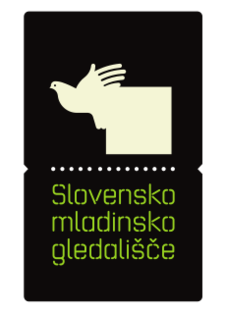
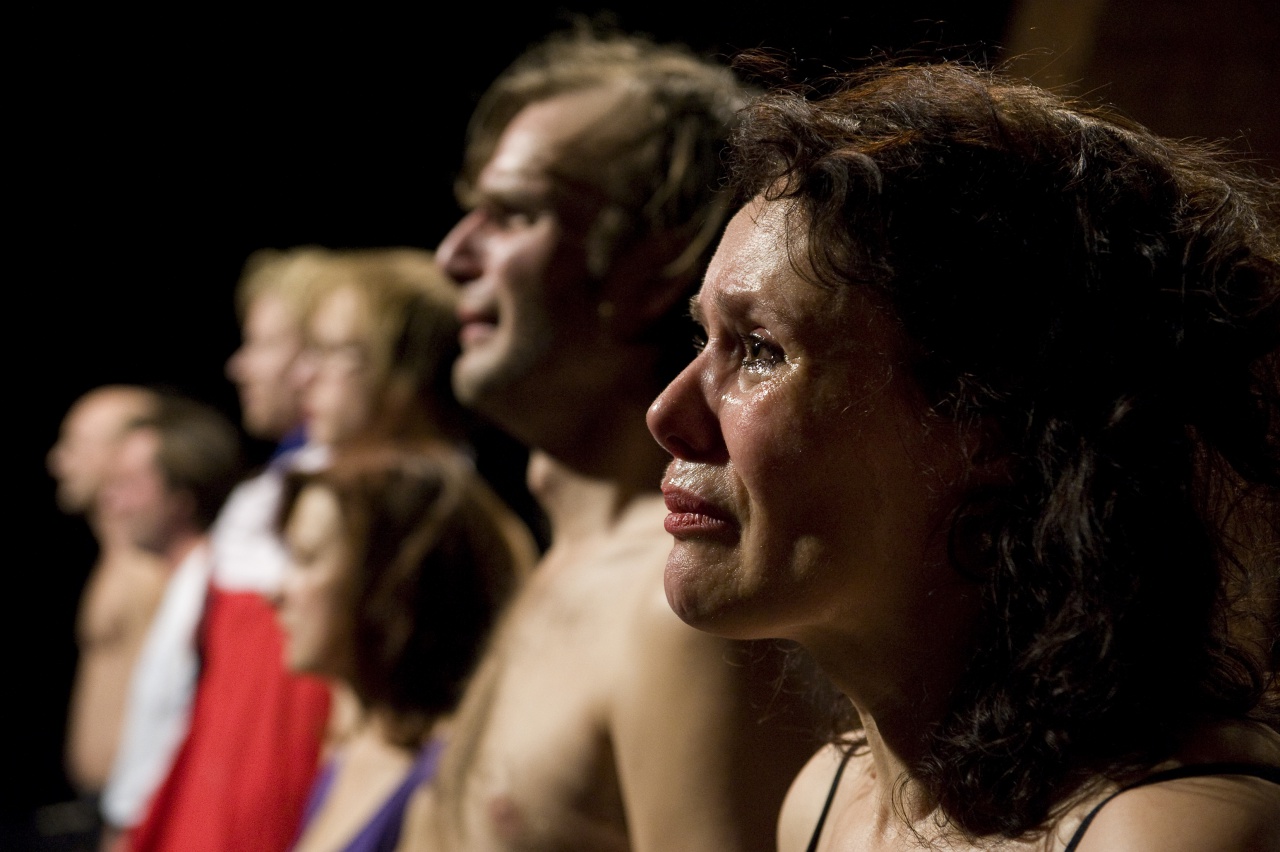
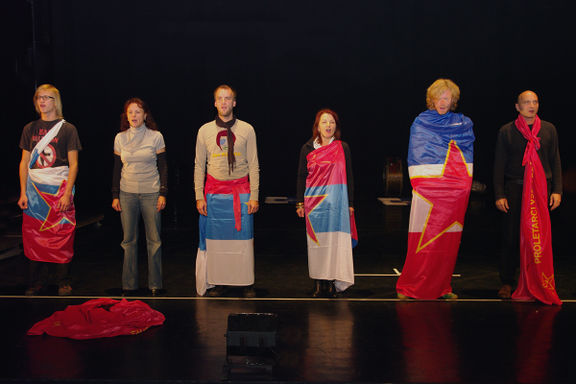
![Still from Pavla Nad Prepadom [Pavla Above the Precipice], a play inspired by the life of mountain climber Pavla Jesih, with the text for the play was written by Andrej E. Skubic. First staged in 2013, the play was featured at Mladinsko Showcase in 2015 (called Prelet at that time).](/images/thumb/f/fc/Mladinsko_Showcase_2013_Pavla_Nad_Prepadom_Photo_Peter_Uhan.jpg/576px-Mladinsko_Showcase_2013_Pavla_Nad_Prepadom_Photo_Peter_Uhan.jpg)
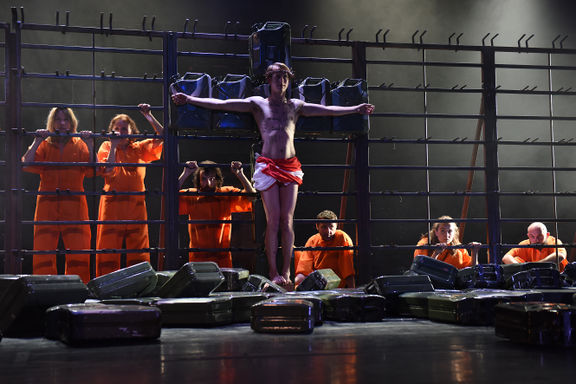
![A still from Republika Slovenija [The Republic of Slovenia], a docudrama about the arms trafficking events from the early years of Slovenia. Shown at Mladinsko Showcase in 2016 and that same year also given the Borštnik Jury Award.](/images/thumb/4/4a/Mladinsko_Showcase_2016_Republika_Slovenija_Photo_Iztok_Dimc.jpg/576px-Mladinsko_Showcase_2016_Republika_Slovenija_Photo_Iztok_Dimc.jpg)
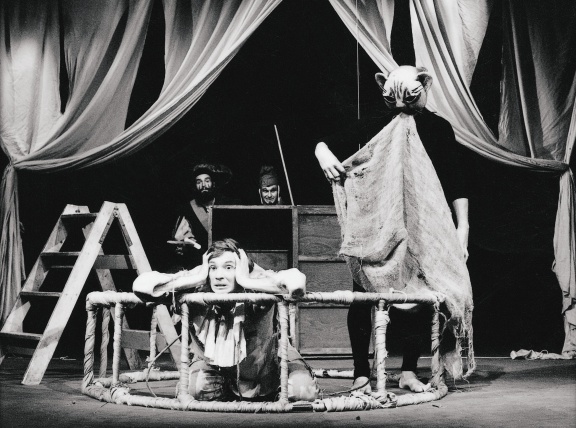
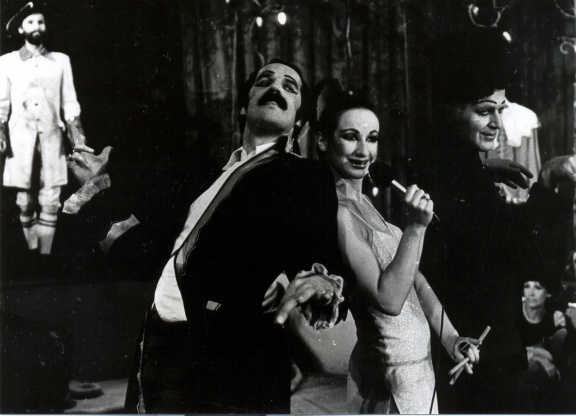
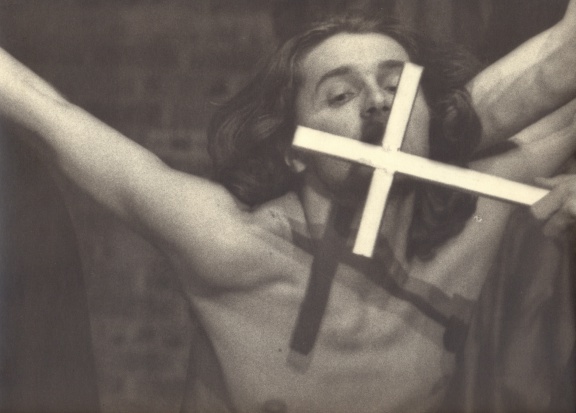
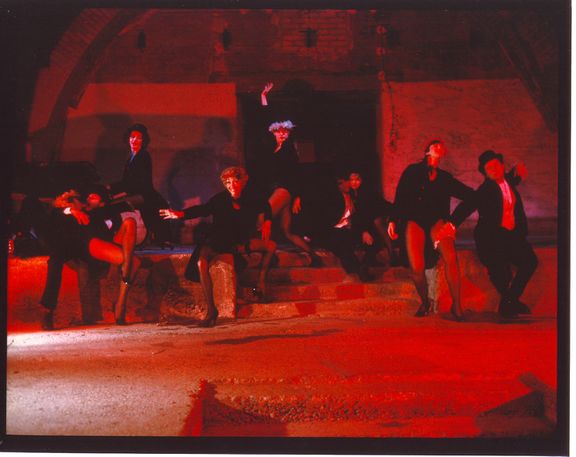
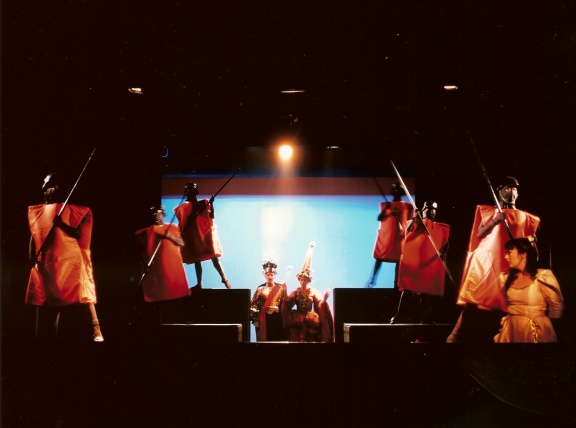
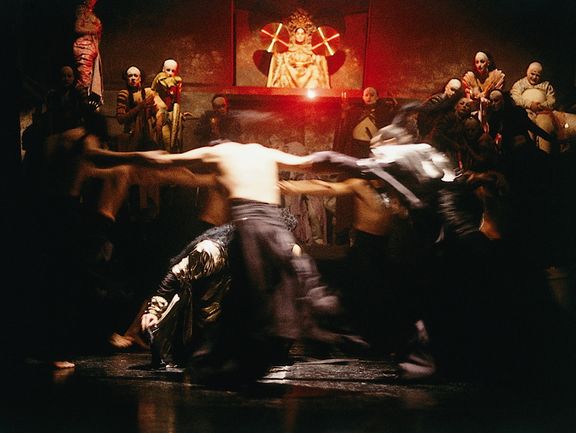
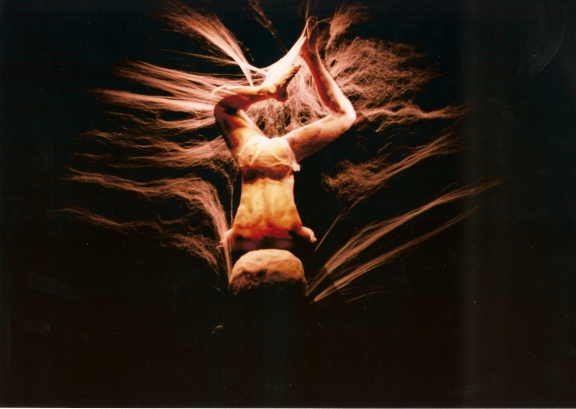
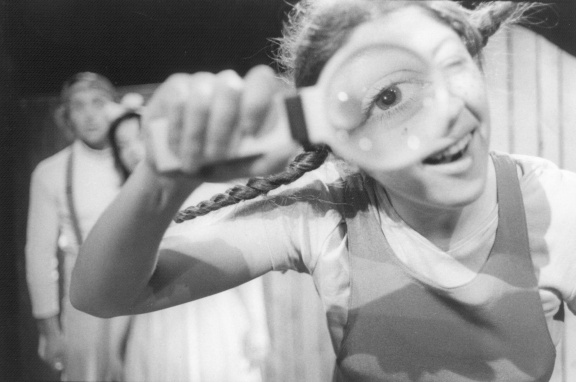
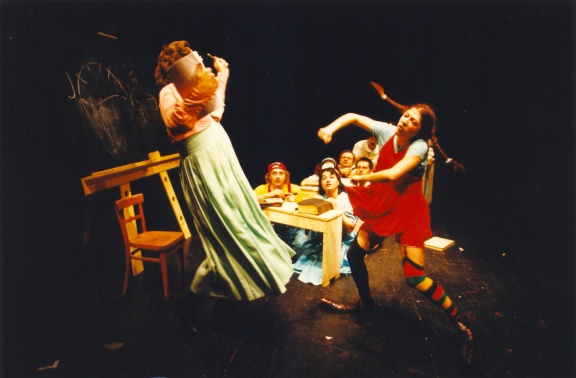
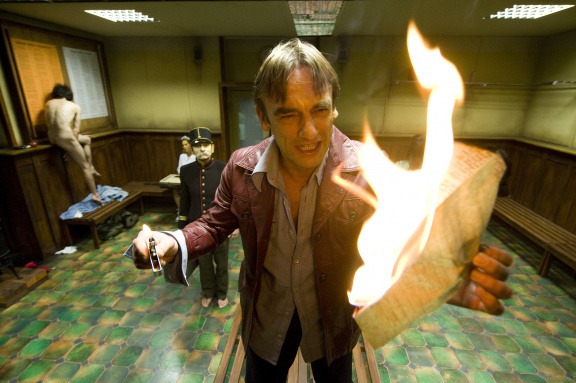
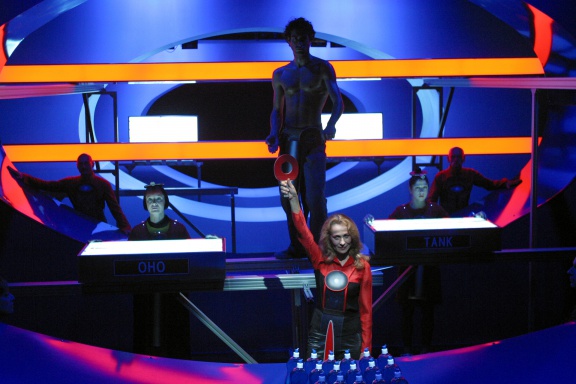
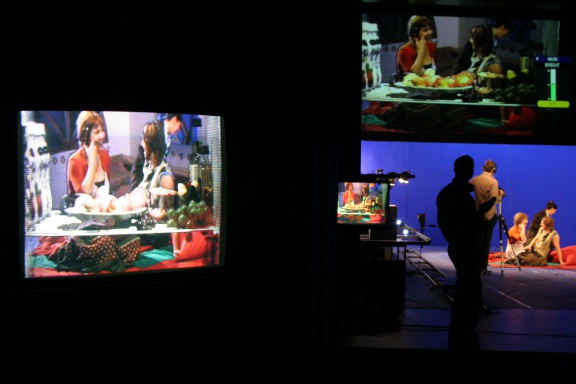
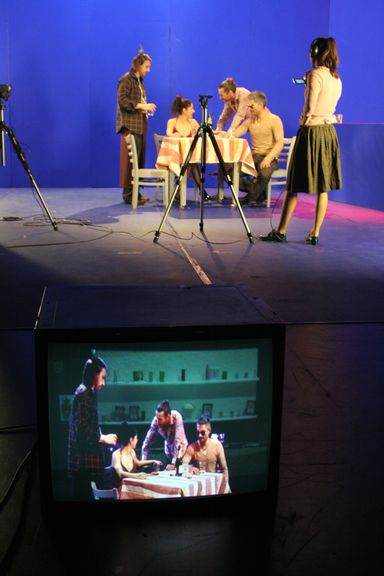
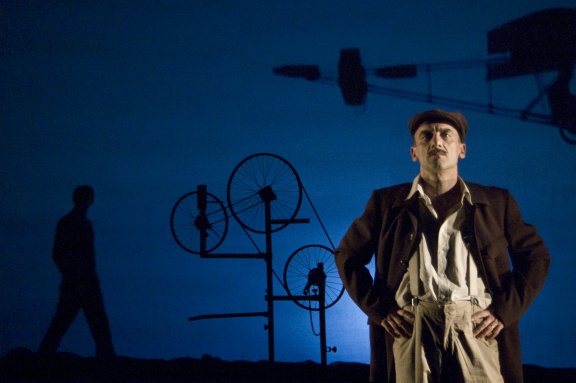
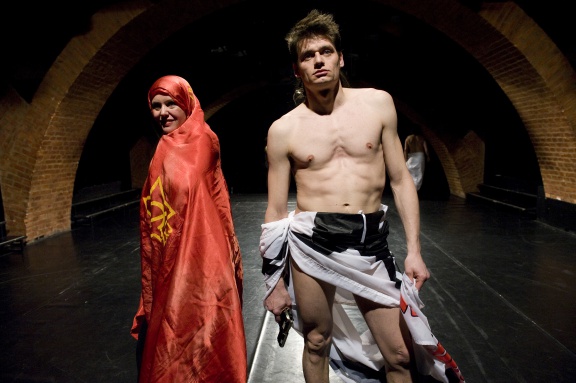
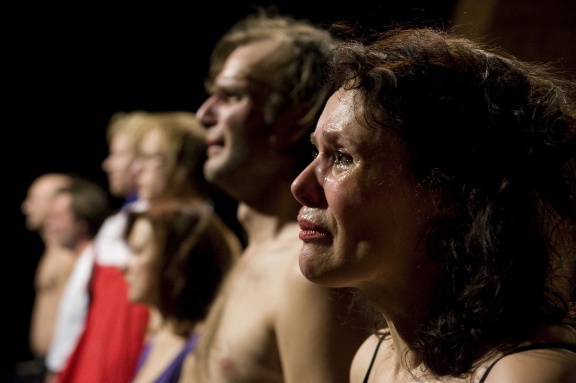
![Sarah Kane's Blasted [Razdejani], directed by Vinko Möderndorfer, Mladinsko Theatre, 2008](/images/thumb/4/44/Mladinsko_Theatre_2010_Razdejani_Photo_%C5%BDiga_Koritnik.jpg/576px-Mladinsko_Theatre_2010_Razdejani_Photo_%C5%BDiga_Koritnik.jpg)
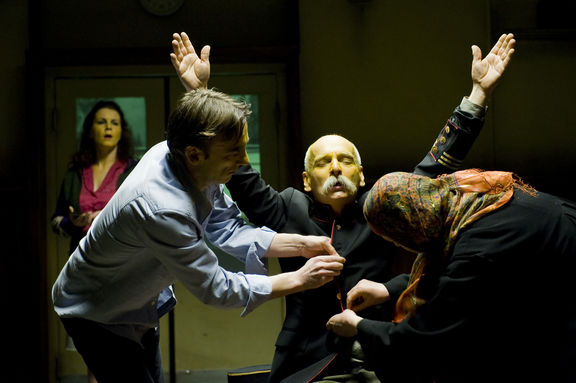
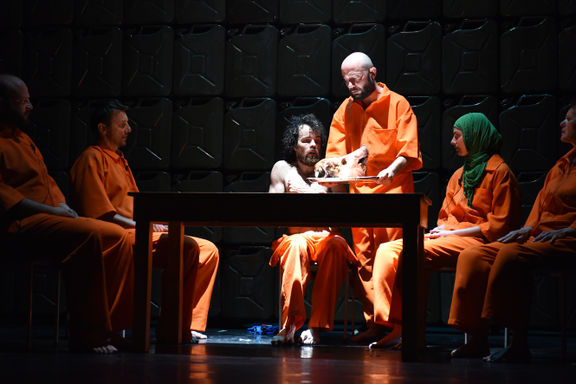
![The Mladinsko Theatre's adaptation of Dostoyevsky's Zločin in kazen [Crime and punishment] was directed by Diego de Brea. With Matija Vastl as Raskolnikov, the show premièred in 2009.](/images/thumb/e/ef/Mladinsko_theatre_2009_Crime_and_punishment_Photo_Ziga_Koritnik.jpg/576px-Mladinsko_theatre_2009_Crime_and_punishment_Photo_Ziga_Koritnik.jpg)
